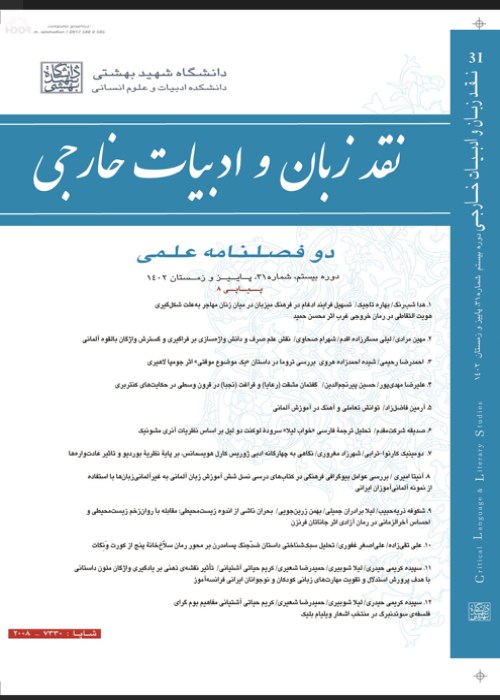The Role of Ideology and Trace in V. S. Naipaul’s narratives of A House For Mr. Biswas and In A Free State
Author(s):
Article Type:
Research/Original Article (دارای رتبه معتبر)
Abstract:
Introduction
A study of V. S. Naipaul’s narratives particularly in A House for Mr. Biswas and In the Free State reveals how the conspiracy between the Althusserian ‘ideology’ and the Derridean ‘trace’ spawn an illusion which masks the real/objective situation in narrative and thus creates a false consciousness in an attempt to perpetuate the ideological drive.
Background Studies
Apart from Paul Theroux’s Sir Vidia’s Shadow and his attempts to castigate Naipaul’s biased outlook in his works, Selwyn R. Cudjoe’s response has been more relevant to the study. In her V. S. Naipaul: A Materialist Reading, she detects an ideological matrix at work in Naipaul’s narratives that propels the plot onward. Cudjoe justifies Naipaul’s negative ideological posture towards the colonized subject through internalizing a different set of ideologies. Bruce King’s V. S. Naipaul is a critical source since it builds up to the same line of thought as to locate Naipaul’s ideology at work. Meenakshi Mukheijee’s The Twice Born Fiction: Themes and Techniques of the Indian Novels in English and Derek Wright’s Autonomy and Autocracy in V.S. Naipaul’s In a Free State directly question the propensity of the colonial narratives on ideology and tracing back the consequences of such tendency.
Methodology and Argument
Though re-considering significant works of Louis Althusser on ideology and ideological interpellation and those of Jacque Derrida on the notion of trace, the present study attempts to implicitly define subjectivity and identity in relation to and perhaps against the normative image of ‘the white man,’ in spite of the explicit criticism of imperialist practices in the narratives of A House for Mr. Biswas and In the Free State. The initial challenge, however, which might hinder the examination of the possible interactions between narrative and alterity, is the difficulty of locating the term itself. Naipaul’s given narratives employ class and race differences to ‘naturalize’ and to regard as a norm the identity of the subject. The Narrative Construction of Alterity, in a way, reconciles the self and the other through the images it attributes to the manipulation of each entity. Alterity stands after the narrative as a way to polarize and differentiate the ‘Self’ with ‘Other’, yet its representation within narrative serves to endorse the operation of ideology in the colonial text which at the same time legitimizes the existence of ‘the Other’ mainly through interpellation. In a Free State shares a familiar theme of the individuals being culturally lost. Upon closer inspection, the narrative of the first two short stories namely "One, Out of Many" and "Tell Me Who to Kill" reveals that the firstperson point of view is dominantly employed in the stories. Active reading of the narration, however, foregrounds an artificiality of the selected viewpoint through its stylistic and narratological peculiarities, which is significantly different from the perspectival point of view adopted in the narration of A House for Mr. Biswas with its hyper-sensitive autobiographical narrator.
Conclusion
Through submerging the theoretical notion of trace in the narrative with the Althusserian notion of ideology, the study concludes that Naipaul’s sense of duality and that of ‘becoming’ is foregrounded in the selected narratives where he attempts to chronicle the dream of independence and self-realization. It further concludes how Naipaul’s narrative is structured around a duality of the textual, spatial alterity and narrative characterization of the ‘other’ as opposed to the heroism of Naipaulian characters. It is thereby attempted to sketch how narrative functions as a local enactment of the process of constructing a logic that legitimizes ‘othering’ process.Keywords:
Ideology , Trace , Interpellation , Alterity , the Other
Language:
Persian
Published:
Critical Language & Literary Studies, Volume:16 Issue: 22, 2019
Pages:
59 to 76
magiran.com/p2008812
دانلود و مطالعه متن این مقاله با یکی از روشهای زیر امکان پذیر است:
اشتراک شخصی
با عضویت و پرداخت آنلاین حق اشتراک یکساله به مبلغ 1,390,000ريال میتوانید 70 عنوان مطلب دانلود کنید!
اشتراک سازمانی
به کتابخانه دانشگاه یا محل کار خود پیشنهاد کنید تا اشتراک سازمانی این پایگاه را برای دسترسی نامحدود همه کاربران به متن مطالب تهیه نمایند!
توجه!
- حق عضویت دریافتی صرف حمایت از نشریات عضو و نگهداری، تکمیل و توسعه مگیران میشود.
- پرداخت حق اشتراک و دانلود مقالات اجازه بازنشر آن در سایر رسانههای چاپی و دیجیتال را به کاربر نمیدهد.
In order to view content subscription is required
Personal subscription
Subscribe magiran.com for 70 € euros via PayPal and download 70 articles during a year.
Organization subscription
Please contact us to subscribe your university or library for unlimited access!


